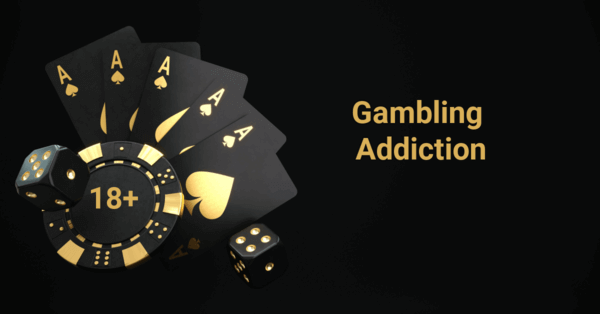Michael | December 8, 2023 | Updated on: December 28th, 2023
Welcome to our comprehensive guide on gambling addiction. While gambling can be an enjoyable and recreational activity for many, it’s important to recognize that it can become problematic for some individuals. This page aims to shed light on the nature of gambling addiction, dispel common myths, identify signs and symptoms, and provide practical tips for overcoming this challenging issue.
What is Gambling Addiction?
Gambling addiction, also known as pathological gambling or compulsive gambling, is a behavioral disorder characterized by an inability to resist the urge to gamble, despite negative consequences. It is a progressive condition that can have severe impacts on an individual’s personal, financial, and social well-being.

Problem Gambling: Myths and Facts
Myth: Problem gambling is a matter of weak willpower.
Fact: Gambling addiction is a complex disorder influenced by various factors such as genetics, environment, and psychological factors. It is not solely a result of weak willpower.
Myth: Only people who gamble excessively can develop a gambling addiction.
Fact: Gambling addiction can affect individuals regardless of the frequency or amount of gambling. It’s the uncontrollable urge and negative consequences that define the addiction, not the quantity of gambling.
Myth: Gambling addiction only affects certain demographics.
Fact: Gambling addiction can affect anyone, regardless of age, gender, ethnicity, or socioeconomic status. It is a condition that transcends demographic boundaries.
Myth: Problem gamblers can simply quit on their own.
Fact: Overcoming gambling addiction often requires professional help, support from loved ones, and a comprehensive treatment plan. It’s not as simple as quitting cold turkey.
Myth: Gambling addiction is a harmless habit.
Fact: Problem gambling can have severe consequences, including financial ruin, strained relationships, mental health issues, and even suicide. It is far from harmless.
Signs and Symptoms of Gambling Addiction
Recognizing the signs and symptoms of gambling addiction is crucial for early intervention. Some common indicators include:
- Preoccupation with gambling and constant thoughts about it
- Increasing amounts of money and time spent on gambling
- Failed attempts to cut down or stop gambling
- Restlessness or irritability when attempting to reduce or quit gambling
- Lying to conceal the extent of gambling involvement
- Neglecting personal and professional responsibilities due to gambling
- Borrowing money or resorting to illegal activities to fund gambling habits
Self-Help for Gambling Problems
If you suspect a gambling problem, here are some self-help strategies you can consider:
- Admit the problem: Recognize and accept that you have a gambling addiction. Honesty is the first step towards recovery.
- Educate yourself: Learn about gambling addiction, its causes, and the potential consequences. Knowledge can empower you to take control of your situation.
- Set limits: Establish strict boundaries for your gambling activities, including time and money limits. Stick to these limits and avoid situations that may trigger compulsive gambling.
- Seek support: Reach out to trusted friends, family members, or support groups dedicated to gambling addiction. Sharing your struggles and receiving support can make a significant difference.
Practice self-care: Take part in activities that enhance your mental and emotional health, such as relaxation techniques, hobbies, and physical activity. The impulse to gamble might be lessened by taking care of oneself.
Tips to Stop Gambling Permanently
Overcoming gambling addiction requires dedication and perseverance. Here are some tips to help you on your journey to recovery:
- Consider professional help: Seek assistance from qualified therapists or addiction counselors who specialize in gambling disorders.
- Block access to gambling: Utilize software or apps that restrict your access to gambling websites or venues.
- Manage finances: Hand over control of your finances to a trusted individual, create a strict budget, and avoid carrying excess cash or credit cards.
- Build a support network: Surround yourself with understanding and supportive individuals who can provide encouragement during challenging times.
- Fill your time: Find healthy and fulfilling activities to occupy your time and divert your attention away from gambling.
Supporting a Loved One with Gambling Addiction: Dos and Don’ts
If someone you care about is struggling with gambling addiction, it’s essential to approach the situation with empathy, understanding, and support. Here are some helpful guidelines on how to navigate this challenging situation:
Dos:
Educate Yourself
Spend some time learning about gambling addiction, its causes, and the effects it can have on sufferers and the people they care about. You can give better support and steer clear of misunderstandings by having a clear understanding of the nature of the addiction.
Express Concern with Compassion
Approach your loved one with care, expressing your concerns about their gambling behavior in a non-judgmental and compassionate manner. Focus on the negative consequences rather than criticizing or blaming them.
Encourage Open Communication
Create a safe and supportive environment where your loved one feels comfortable discussing their struggles and emotions. Listen actively, without interruption or judgment, and validate their feelings.
Offer Emotional Support
Let your loved one know that you are there for them, offering emotional support throughout their recovery journey. Encourage them to express their emotions, and be patient and understanding during moments of vulnerability.
Help with Practical Matters
Assist your loved one in managing their finances responsibly. Offer to help create a budget, pay bills, or take control of their financial affairs temporarily to prevent further harm caused by gambling.
Don’ts
Don’t Enable the Addiction
Avoid providing financial bailouts or covering up the consequences of their gambling behavior. Enabling can perpetuate the addiction and hinder their motivation to seek help.
Don’t Lecture or Lecture
Avoid lecturing or preaching to your loved one about their addiction. Lecturing can create defensiveness and distance in the relationship, making it harder for them to open up or seek support.
Don’t Judge or Criticize
Resist the urge to criticize or judge your loved one. Instead, focus on understanding and supporting them through their recovery process. Remember, addiction is a complex issue, and compassion goes a long way.
Don’t Take Responsibility
Recognize that you cannot control or “fix” your loved one’s addiction. Gambling addiction is a personal struggle that requires their commitment and effort to overcome. Avoid blaming yourself or assuming responsibility for their actions.
Don’t Neglect Your Well-being
Providing emotional support to a loved one who has a gambling addiction can be exhausting. It’s crucial to put yourself first and look for assistance for yourself. Take breaks, indulge in self-care practices, and think about signing up for support groups for loved ones of addicts.
Understanding Gambling Addictions
Understanding the nature of gambling addiction, recognizing the signs, and seeking support are crucial steps towards overcoming this challenge. Remember, you are not alone, and there is hope for recovery. By implementing self-help strategies and reaching out for professional assistance, you can reclaim control of your life and break free from the grip of gambling addiction.

